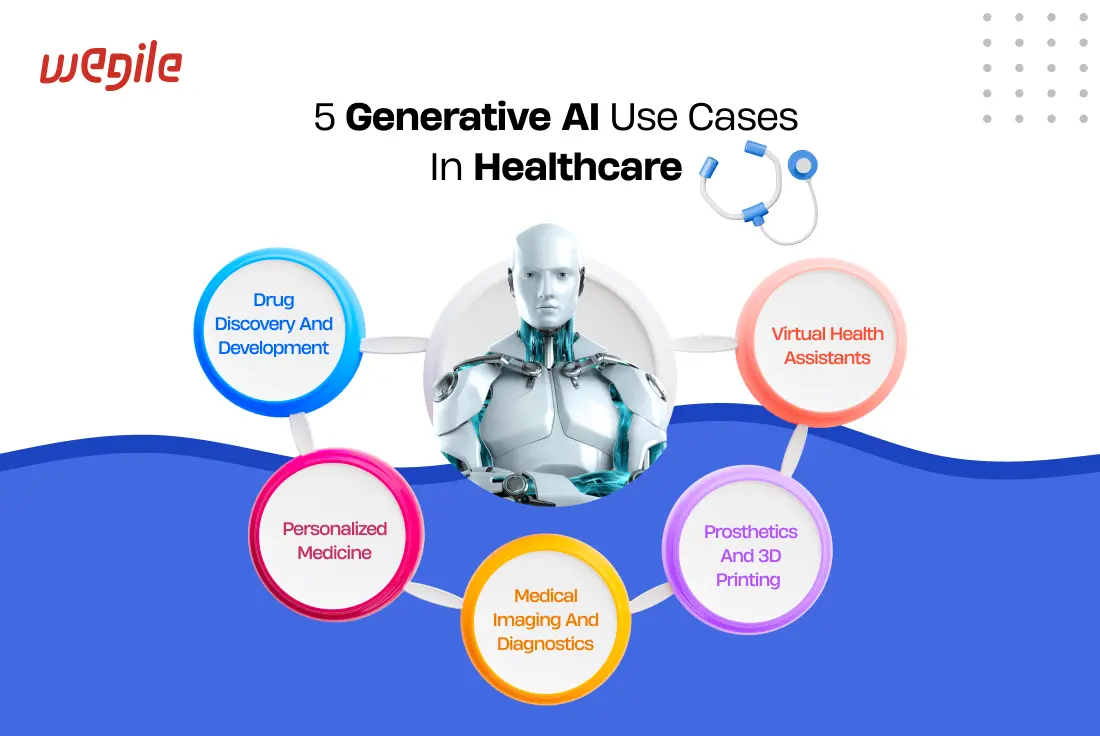Technology is indeed a game-changer in many fields, but it's making a huge splash in healthcare. What's leading the charge? Generative AI. This technology isn't just another IT trend; it's a revolutionary approach that can create new data, simulate scenarios, and make decisions that used to require human input. Generative AI has an extensive and expansive role in the real world. Envision a computer not just providing information but also creating it to solve complex health problems. That's generative AI for you!
Imagine a world where every medical challenge, from global pandemics to managing the health of aging populations, is tackled not just by doctors and nurses but also by intelligent technologies. Generative AI is stepping up as that brilliant tech hero. It’s transforming everything from how we talk to our doctors to how new medicines are discovered.
And, the numbers are just as impressive; analysts predict that AI in healthcare, worth about $11 billion in 2021, could soar to $188 billion by 2030. That's huge!
But there's more to it than money. Generative AI might boost the global economy by up to 7% in the next decade. It isn’t just about better healthcare, it’s about creating a smarter, more efficient world.
In this blog, we'll uncover the top five ways generative AI makes waves in healthcare. Get ready to see how this tech is changing the game in medicine and paving the way for a future where healthcare is smarter, more personalized, and, above all, more efficient.
Let’s explore these exciting developments together!

Generative AI is making waves in drug discovery by significantly speeding up the process. Traditionally, developing a new drug could take over a decade and cost billions of dollars, with a high failure rate. However, with the help of Generative AI, these timelines and costs are dramatically reduced. For instance, generative AI can simulate the behavior of drug molecules in the body, predict how they interact with biological targets, and even help design new molecules with desired properties. It speeds up the experimental phase and allows researchers to bypass some of the initial trial and error typically associated with drug development.
One notable success story is INS018_055, a drug developed using generative AI that entered human trials in less than three years, a record time compared to traditional methods. This drug, aimed at treating idiopathic pulmonary fibrosis, showed promising results in early trials and has already progressed to Phase 2 clinical testing.
Another example is the collaboration between Deloitte and NVIDIA, where they employed AI to enhance the drug discovery process, integrating vast amounts of data from various sources to streamline the development of new drugs.
Beyond discovering new drugs, generative AI also finds new uses for existing medications. IBM’s research, for example, has successfully used AI to identify new therapeutic uses for existing drugs. This not only extends the lifecycle of these drugs but also speeds up the availability of treatment options to patients. It highlights the versatile potential of AI in enhancing the efficiency and scope of pharmaceutical research.
Generative AI is transforming the drug discovery and development landscape by making it faster, more cost-effective, and more efficient. As this technology evolves, it holds great promise for advancing the treatment of complex diseases, unlocking new possibilities for healthcare and medicine that were previously unattainable. This ongoing evolution of AI technology in the pharmaceutical industry continues to open up new horizons for better patient outcomes and streamlined drug development processes.
Personalized medicine is a tailored approach to healthcare, where medical decisions and treatments are customized to the individual patient. This approach is important as it allows for more precise and effective treatments based on a patient's genetic makeup, lifestyle, and other personal factors.
Generative AI is revolutionizing personalized medicine by enabling the analysis of vast amounts of genetic data. This technology helps predict how patients might react to different treatments, allowing for highly tailored therapies that are more effective and have fewer side effects.
For example, AI-driven platforms like Microsoft Azure OpenAI are being used to enhance healthcare delivery by integrating vast datasets to personalize patient care plans significantly.
Generative AI is making personalized medicine more practical, efficient, and accessible, paving the way for a future where healthcare is more tailored to individual patient needs. This technology promises to transform the landscape of medical treatment, making it as personalized and precise as possible.
Generative AI is making significant strides in medical imaging, which is crucial in diagnosing and treating various diseases. This technology enhances the analysis of medical images by detecting subtle anomalies that the human eye might miss. It's not just about interpreting existing images, generative AI can also create detailed, synthetic images for training and research purposes, thus enriching the tools available to healthcare professionals.
The use of generative AI in medical imaging and diagnostics not only improves the accuracy and efficiency of medical evaluations. It also holds the potential to transform how medical care is delivered by providing more profound, more accessible insights into patient health. As these technologies continue to develop, they promise to unlock even more sophisticated tools for medical professionals worldwide.
The integration of generative AI with 3D printing technology is transforming the field of prosthetics by enabling highly customized prosthetic solutions. This synergy allows for the creation of prosthetic limbs that are functionally effective and tailored to the individual's physical and biomechanical needs.
For example, Limbitless Solutions has used this technology to allow children to personalize their prosthetic arms, incorporating designs inspired by video games and movies, which helps enhance children's connection with their prosthetics.
Using AI algorithms, prosthetic limbs can be designed to fit the exact dimensions of the user's residual limb, accounting for unique contours and biomechanical movements. It guarantees not just a snug fit but also optimizes the limb's functionality for everyday tasks, significantly improving users' comfort and overall life quality.
For example, the company Ocupeye Ltd., in collaboration with the Fraunhofer Institute, has applied this technology to produce prosthetic eyes that are anatomically accurate and aesthetically matched to the patient's other eye.
The use of generative AI in designing prosthetics extends beyond aesthetics, enhancing functionality and comfort. Advanced algorithms analyze a vast amount of data to predict optimal prosthetic performance under various conditions, allowing for adjustments in the design that cater to different activities or lifestyle needs. This approach has been instrumental in developing prosthetic eyes at the Fraunhofer Institute. AI-driven designs now enable quicker production and a better fit, reducing patient adaptation period and enhancing comfort.
These advancements indicate a promising future for prosthetic technology, where personalization and functionality merge to create solutions that are deeply integrated with the user's life, improving mobility, personal identity, and confidence.
AI-powered virtual health assistants (VHAs) are innovative tools transforming the healthcare landscape. These digital assistants leverage artificial intelligence to interact with patients, offering 24/7 access to healthcare services, managing appointments, and providing personalized health advice. By understanding and processing natural language, these VHAs can perform various tasks that traditionally require human interaction, thereby enhancing the efficiency and accessibility of healthcare services.
VHAs utilize advanced AI technologies, including natural language processing and machine learning, to deliver tailored healthcare services. They can schedule appointments, answer frequently asked health questions, remind patients to take their medications, and even provide critical health information during public health emergencies.
For example, during the COVID-19 pandemic, virtual assistants were employed extensively to disseminate accurate health information and manage public inquiries efficiently.
These assistants can also monitor patient health and manage chronic conditions by analyzing patient data and providing actionable advice. This proactive approach helps in early detection and management of potential health issues, leading to better patient outcomes.
Integrating VHAs in healthcare is expected to reduce healthcare professional’s workload. By automating routine tasks and patient interactions, VHAs free up medical staff to focus on more complex and urgent care needs. These assistants improve patient engagement by providing continuous support and personalized interaction, crucial for chronic condition management and overall patient satisfaction.
As the technology continues to evolve, the role of VHAs is expected to expand further, incorporating more advanced AI capabilities to offer even more personalized and proactive healthcare solutions. It will enhance patient care and streamline healthcare operations, making the system more efficient and responsive to patient needs.
It's not all smooth sailing when we talk about artificial intelligence in healthcare. There are quite a few bumps along the road that need careful navigation. Let’s dive into some of these challenges and ethical considerations.
One of the biggest challenges is protecting patient data. With AI, heaps of data are analyzed to improve healthcare services. But imagine if this sensitive information got into the wrong hands. Scary, right? Ensuring that patient data is secure and only accessible to authorized personnel is crucial. Healthcare providers must adhere to strict privacy laws and regulations, ensuring that all AI systems are watertight regarding data security.
Here’s another hiccup: AI is only as good as the data it learns from. If this data is biased, the AI's decisions will be too. This can lead to unfair treatment decisions or diagnostic conclusions, particularly affecting minorities or underrepresented groups. AI systems need to be trained on diverse, inclusive datasets to prevent this. Ongoing monitoring is essential to ensure these systems remain unbiased and fair.
AI models thrive on quality data. The more accurate and comprehensive the data, the better AI can perform. However, gathering such robust training data is a challenge. It involves large quantities and high-quality, well-labeled data sets that genuinely represent the real-world scenarios in which they will operate. Ensuring the data's relevance and breadth is vital for the effectiveness of AI applications in healthcare.
Now, onto the ethical side of things. Implementing AI in healthcare, a field dealing with human lives raises significant moral questions. For instance, how much should we rely on AI to make critical healthcare decisions? There’s also the issue of transparency, patients and providers must understand how AI comes up with its recommendations. And let's not forget about the potential for AI to perpetuate existing healthcare disparities. Ensuring ethical deployment of AI involves rigorous standards, clear guidelines, and a commitment to equitable healthcare outcomes.
As we've explored the vast possibilities of generative AI in healthcare, it's clear this technology isn't just a passing trend, it’s a major force reshaping the future of medicine. From speeding up drug discovery to personalizing patient care and enhancing diagnostic accuracy to revolutionizing prosthetics and virtual health assistance, generative AI is at the forefront of medical innovation.
The potential for generative AI to enhance and transform healthcare is immense. It promises more efficient and effective treatments and a more personalized approach to patient care. As the technology continues to develop, it will unlock new possibilities once thought impossible, providing hope and improved patient outcomes worldwide.
However, the journey has its challenges. Data privacy, algorithmic bias, and the ethicaAI's ethical implications in medicine must fully realize the benefits while safeguarding patient interests. By navigating these challenges thoughtfully, the healthcare sector can ensure that generative AI serves as a beneficial tool, enhancing the capabilities of medical professionals and improving patient care.
As we look to the future, the role of generative AI in healthcare is only set to expand, offering exciting prospects for a healthier, more efficient world. Get all the benefits by connecting with a generative AI app development company and explore our blog to see how they are pioneering changes in healthcare with cutting-edge solutions.


 Browse Our Services
Browse Our Services
